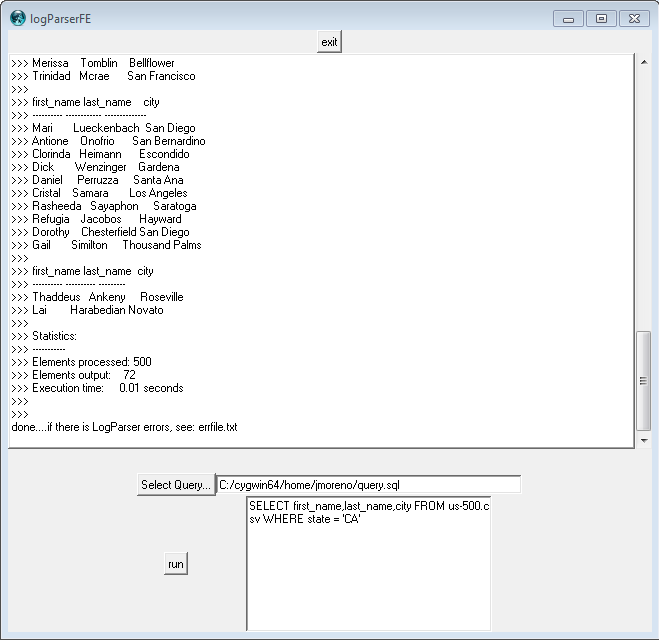LogParser
Jorge Moreno 2006-02-10 - Here is a frontend for LogParser
http://www.microsoft.com/technet/scriptcenter/tools/logparser/default.mspx <<< not there anymore
https://technet.microsoft.com/en-us/scriptcenter/dd919274.aspx
- Of course, windows only
- Very incomplete, proof of concept only
Very powerful text file parser:
- SQL like query definition
- output to a file, console, chart, Database
- multiple text files treated as a single set of data
- handles various input file types (CSV, TSV, XML,etc)
- much more...
screenshot:
Step 1, Get the sample data:
http://www.briandunning.com/sample-data/ file: us-500.zip (which contains us-500.csv)
Make sure you convert the sample file to DOS format CR+LF (Its original format is Unix format so LF only for line termination)
You can do that by opening in excel and then overwriting to CSV format, or change the format with your favorite text editor.
Step 2, Prepare your query in a separate file
filename: query.sql, contents:
SELECT first_name,last_name,city FROM us-500.csv WHERE state = 'CA'
Dependecies in this example:
- the path to LogParser is hard-coded "C:\Program Files (x86)\Log Parser 2.2"
- the default query file called "query.sql" mentioned above
You will see some code being reused from this wiki (like RS's proc e'get) used in e: a tiny editor plugin for eTcl
console show
set types {*.sql}
proc invoke command {
global fh
set fh [open |$command r+]
set stdout [read $fh]
set stderr {}
set status [catch {close $fh} stderr e]
if {$status} {
dict with e {}
lassign [set -errorcode] sysmsg pid exit
if {$sysmsg eq {NONE}} {
#output to stderr caused [close] to fail. Do nothing
} elseif {$sysmsg eq {CHILDSTATUS}} {
return [list $stdout $stderr $exit]
} else {
return -options $e $stderr
}
}
return [list $stdout $stderr 0]
}
proc e'get name {
if [file exists $name] {
set f [open $name]
set ::g(filename) $name
K [read $f] [close $f]
} else {corp $name}
}
proc K {a b} {set a}
proc showSQL sqlFile {
.ctrls.qryPath delete 0 end
.ctrls.qryPath insert end $sqlFile
.ctrls.sql delete 1.0 end
foreach line [split [e'get $sqlFile] \n] {
.ctrls.sql insert end $line\n
}
}
proc Run {} {
global fh log but command header query
puts [pwd]
$log delete 1.0 end
set results [invoke "\"C:/Program Files (x86)/Log Parser 2.2/LogParser.exe\" \
-i:CSV \
\"[.ctrls.sql get 1.0 end]\" \
-headerRow:ON"]
$log insert end "[lindex $results 0]"
$log insert end "[lindex $results 1]"
#$log see end
}
frame .t
frame .ctrls
set log [text .t.log -width 80 -height 30 \
-borderwidth 2 -relief raised -setgrid true \
-yscrollcommand {.t.scroll set}]
scrollbar .t.scroll -command {.t.log yview}
canvas .c -height 20 -width 640
set but [button .ctrls.run -text "run" -command Run]
button .ctrls.qry -text "Select Query..." -command {
set query [tk_getOpenFile -filetypes [list [list "All files" $types]]]
showSQL $query
}
entry .ctrls.qryPath -width 50
button .quit -text "exit" -command exit
text .ctrls.sql -width 40 -height 10
pack .quit
pack .t.scroll -side right -fill y
pack .t.log -side left -fill both -expand true
pack .t -side top -fill both -expand true
pack .c
grid .ctrls.qry .ctrls.qryPath
grid .ctrls.run .ctrls.sql
pack .ctrls
#default header file
set header "[pwd]/header.txt"
#default query file
set query "[pwd]/query.sql"
if [file exists $query] {
.ctrls.qryPath insert end $query
showSQL $query
} else {
tk_messageBox -message "There is no default query file defined\n
($query was expected)"
}
See also:
